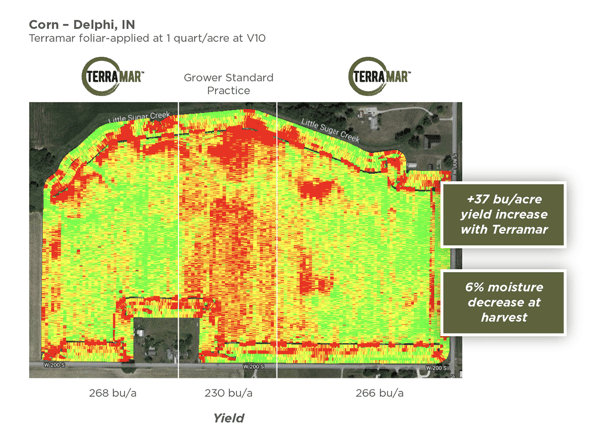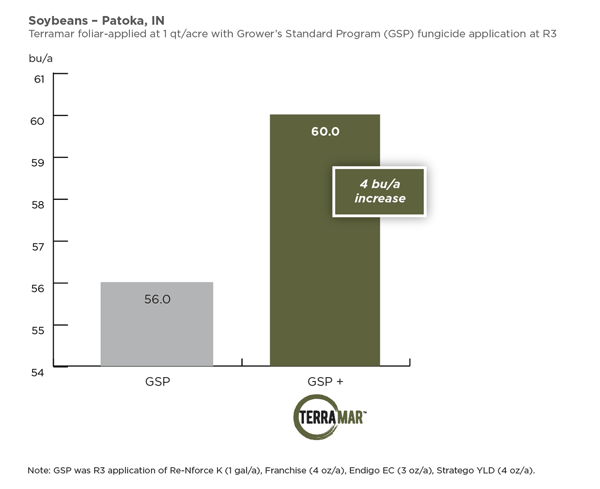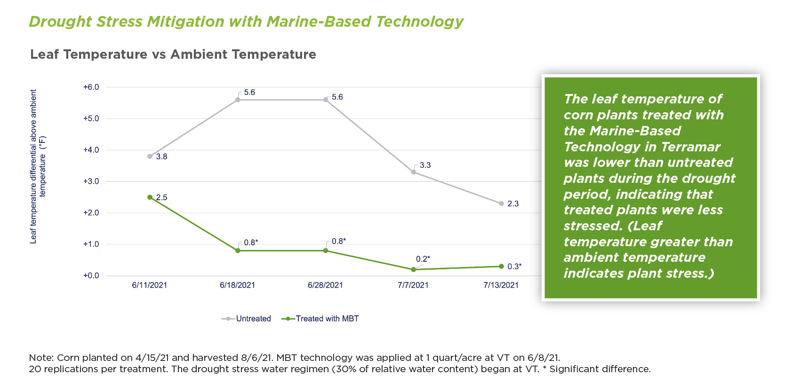Growers know all too well that hot and dry conditions can contribute to yield loss in corn and soybean crops, especially when these stresses last for a prolonged period of time. TERRAMAR gives growers the opportunity to mitigate the effects of these weather-related stresses so that their crops can hold on to their yield potential.
There are two key opportunities for making a TERRAMAR application on corn and soybeans. The first opportunity to apply TERRAMAR is with the early post herbicide pass, typically at the V4-V5 growth stage in both crops. The second opportunity is with a fungicide or foliar plant nutrition pass on corn and soybeans. For those who have already applied TERRAMAR earlier in the season, a two-pass program (first at the early vegetative growth stage, then at the reproductive stages) may be beneficial, particularly if crops are under prolonged stress.
In corn and soybeans, the window for applying TERRAMAR with fungicide or plant nutrition products is:
- Corn - V10 (early season) through R3 (tar spot)
- Soybeans - Pre-bloom through R3
All TERRAMAR applications made at reproductive stages should be at a minimum rate of 1 quart/acre. Applications can be made by airplane, helicopter or a ground rig.
Below are two examples of recent trials in which TERRAMAR was applied at reproductive stages in corn and soybeans, leading to yield increases compared to the grower's standard practice.


Impact of Heat and Drought Stress During Corn and Soybean Reproductive Stages
Typical fungicide applications occur as much of the Corn Belt, East and South begins to experience the most extreme time of heat and drought stress.
These conditions can have a significant, negative impact on the ability of corn and soybean crops to reach their full yield potential. About two weeks before silk emergence, corn enters the period of grain yield determination that is most sensitive to heat and drought stress. At this stage, wilting of the plant due to stress can decrease yield by 3-4% per day. During the silking and pollen shed period, severe stress may reduce yield up to 8% per day and, in the two weeks following silking, severe stress may reduce yield up to 6% per day.
In soybeans, stress during reproductive stages (R1 to R3) can lead to as many as 60-75% of flowers and up to 50% of the formed pods vulnerable to being aborted.
How TERRAMAR Helps to Address Heat and Drought Stress
TERRAMAR has a unique ability to minimize stress by lowering the canopy temperature and increasing photosynthetic capacity during this critical window.
As seen in the chart below, the technology in TERRAMAR lowered the canopy temperature of highly stressed corn for a window of more than 30 days. A lower canopy temperature means less stress for the plant.
As we approach the reproductive stages of both corn and soybeans, the potential for yield loss increases daily. This is where TERRAMAR can play a significant role in helping them “Stand Up to Stress” for a better-performing plant and a better overall outcome.
Learn more about Terramar by downloading the Terramar Row Crop Bulletin.







